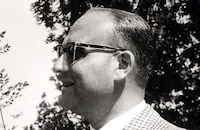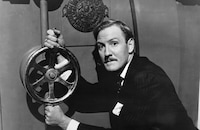Roommates

Brief Synopsis
Cast & Crew
Gerald Thomas
James Robertson Justice
Leslie Phillips
Sidney James
Paul Massie
Kenneth Williams
Film Details
Technical Specs

Synopsis
Aspiring musicians Jill, Malcolm, Alex, Mervyn, and Miranda meet for the first time at the London Academy of Music and Arts and decide to share a house. At school, they are fearful of the fiery-tempered conductor, Sir Benjamin, and angered by Harold, a smug student. All are competing for the Strauss Scholarship, given to the student of the year. On a dare, Mervyn composes a song, which he sells to Sid, a music agent. Realizing that his act may cost him the scholarship, Mervyn attempts to buy back the song, but Sir Benjamin reveals that the tune was actually stolen from a classical piece. Miranda eventually wins the scholarship, after Harold fails his conducting test. She and Mervyn fall in love, as do Malcolm and Jill.

Director

Gerald Thomas
Cast

James Robertson Justice

Leslie Phillips
Sidney James

Paul Massie

Kenneth Williams
Eric Barker
Liz Fraser
Jennifer Jayne

Esma Cannon
Geoffrey Keen

Jill Ireland
Jimmy Thompson
David Lodge
Lance Percival
Ambrosine Phillpotts
Joan Hickson
Michael Nightingale
Oliver Johnston
Cyril Chamberlain
Dorinda Stevens
Brian Oulton
George Woodbridge
Peter Howell
Frank Forsyth
Michael Miller
Henry Davies
Horace Seguira

Victor Maddern
Charles Stanley
Erik Chitty
Douglas Ives
Ian Wilson
Tom Clegg
John Antrobus
Kenneth Cove
Bernard Hunter
Peter Burton
Terence Holland
Jim Dale
Nigel Arkwright
Peter Byrne
Crew

Film Details
Technical Specs

Award Nominations
Best Makeup
Articles
Roommates -
Raising the Wind is a frothy comedy about musical students from the fictional London Academy of Music and the Arts who decide to share an apartment to save money and have a space to practice. One of the students, Mervyn (Phillips) writes a song and later sells it while drunk to ad men Sid (James) and Harry (Lance Percival) for £50. When he sobers up, he remembers that selling the song would violate the terms of his student grant and desperately tries to buy it back, but Sid and Harry want £500 that Mervyn doesn't have.
Under the working title of The Happy Band, the film was shot at Pinewood Studios in Buckinghamshire, with the music academy exterior filmed at University College on Gower Street in London, which was also used as the exterior for the fictional St. Swithin's hospital in the Doctor series. The screenplay and original story were by Bruce Montgomery, and director Gerald Thomas found it so funny that he wrote Montgomery that it had caused him to "put on several pounds in weight through laughing." The multi-talented Montgomery (who wrote detective novels under the pseudonym of Edmund Crispin) composed and conducted the film's score (his 40th at the age of 39) and acted as a technical advisor for actor Leslie Phillips, who he taught to conduct so convincingly that the Sinfonia of London, the real orchestra used in the film, applauded Phillips after a take. Montgomery himself would appear as the conductor of The Messiah.
Montgomery enjoyed working in the familiar atmosphere of Raising the Wind since he had written the film scores for all of the Carry On and Doctor films up to that time. In preparation for filming, Montgomery asked his friend Thomas Armstrong if Gerald Thomas and producer Peter Rogers could visit the Royal Academy of Music to get atmosphere for the film. Armstrong had a difficult time choosing just 60 members of the London Philharmonic Choir to appear onscreen because there were so many volunteers.
Although Bruce Montgomery would later write that Raising the Wind wasn't "a picture calculated to raise the cultural tone of the nation," it certainly raised the box office take for the British film industry when it was an overwhelming success after its premiere at the Plaza Theater in Lower Regent Street, London on September 7, 1961. It would earn more than any other film up to that point in 1961 at the box office.
By Lorraine LoBianco
SOURCES:
https://www.bfi.org.uk/films-tv-people/4ce2b6b3e18e1
http://collections-search.bfi.org.uk/web/Details/ChoiceFilmWorks/150032829
The Internet Movie Database
Whittle, David Bruce Montgomery/Edmund Crispin: A Life in Music and Books

Roommates -
Quotes
Trivia
Notes
Opened in London in September 1961 as Raising the Wind.

Miscellaneous Notes
Released in England September 1961
color














